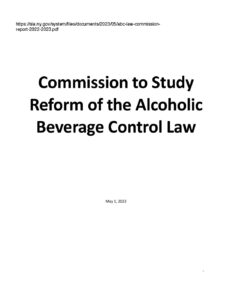2023 Commission to Study Reform of the Alcoholic Beverage Control Law (ABC) - 30 Day Notice Amended
<edited March 12, 2025>
In 2022-2023, its seems a a result of a proposal by the Governor, efforts were initiated to amend the Alcohol and Beverage Control Law which governs the State Liquor Authority. The bill was initiated in the Senate. Sponsors of the bill on the Senate side were Harry B. Bronson , primary sponsor, (D – 138 Albany) and Donna A. Lupardo, co-sponsor, (D – 123 Binghampton).
[Under our radar … ] It appears that “a temporary state commission, known as the “Commission to Study Reform of the Alcoholic Beverage Control Law (ABC) was created as part of the enacted fiscal year (FY) 2023 New York State Budget apparently in response to a report from the Governor. The commission produced several documents and issued a Report on May 1, 2023.
The Method of Operation was not discussed, but the Report did discuss the difficulty in obtaining licenses at page 60. The commission had no public interest member, except for Andrew Rigie, Executive Director, NYC Hospitality Alliance. Rigie was at the time and is a central player in the critical COVID issues facing the restaurants composing of the alliance including the outside sheds which served liquor in probable violation of the liquor laws, and the laws needed to be fixed.
In support Rigie stated:
The first item describe at 62 was:
Amendments Question 1: As a commission member, do you recommend that New York State amend
section 110-b of the ABC Law (Notification to Municipalities) to allow applications to be submitted to the
SLA before the 30-day municipal notice period runs (while also preventing the SLA from issuing a license
before the 30-day municipal notice period has run)?”
Rigie stated at 62:
New York State must expedite the process to get new businesses open
faster because the current slow process creates burdens for small
businesses, harms job growth, reduces tax revenue and harms economic
activity and creates a negative business climate. This recommendation can
speed processing times while preserving community input.”
The Committee unanimously supported this position.
Ultimately, the only provision concerning the liquor license process was one that created issue for many restaurant owners: Community Boards often delayed filing of application for a license to the SLA by constantly adjourning consideration of licenses, often requiring the applicant to agree to a stipulation. The new law ultimately adopted started the clock running when the applicant provided notice to the Community Board. See the recent case where the SLA proceeded without waiting for the Community Board.
See discussion of the amendment re the notice to community boards.
Final Bill as adopted.
Amendment The New York State Liquor Laws
